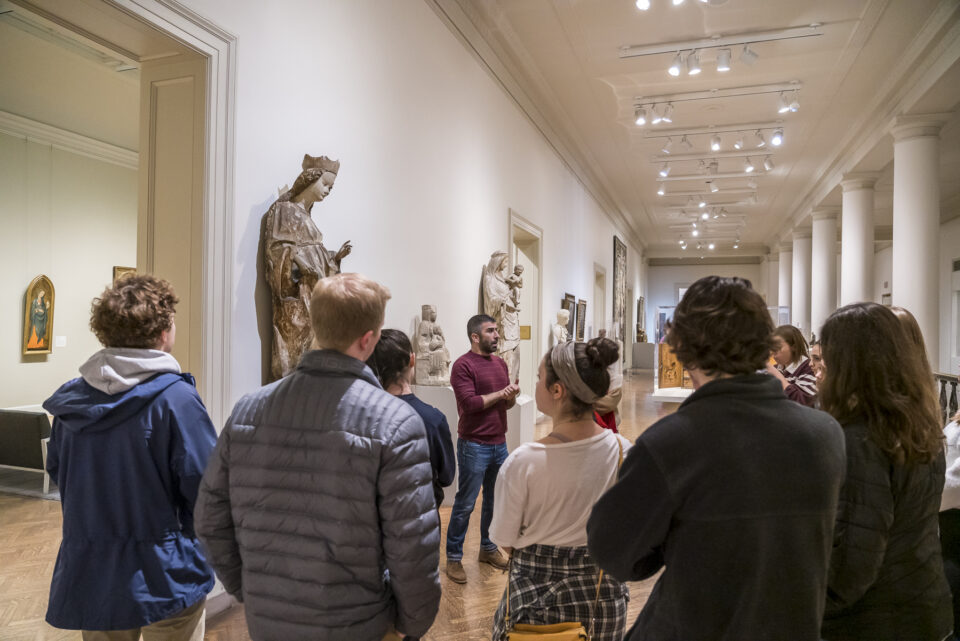
Your First-Year Course
Among your academic milestones at Macalester, stands the First-Year Course ready to lead the way. More than a class, here you’ll connect to your academic advisor and join new classmates as you begin your liberal arts education.
ROCKET SCIENCE
What is a First-Year Course?
During your first semester all first-year students take one course designated as a First-Year Course (FYC). Each course is limited to 16 incoming students and is taught in seminar style, inviting ongoing participation and rich discussion. Hear students describe the FYC.
Most First-Year Courses pay particular attention to writing and library research to introduce students to these skills and offer guidance around the academic expectations at Macalester. Many courses also utilize student writing preceptors to provide additional writing support and peer mentoring. Often these courses are regular department offerings that have been tailored to the needs of incoming students.
Selecting your First-Year Course
New students heading to Macalester will hear from Mac the summer prior to entering with a request to fill out a course preference form. There will be instructions on the steps you take for registration, and you’ll get reminders as the due date approached.
Once matched to your First-Year Course, the professor for that course is also your advisor when you begin college at Macalester. This means new students have immediate access to their advisor for academic questions and general advice about learning at Mac.
You’ll connect with your professor and will have time to meet with them during Orientation. After the first semester, students may keep their advisor and choose other academic advisors that align with their academic interests.
Residential First-Year Courses
Some First-Year Courses are designated as residential courses. Students who enroll in one of these courses live near one another in the same residence hall, usually on the same floor. This facilitates discussion and group work outside of the classroom.
More First-Year Course Examples
Seeing Performance in the Twin Cities: Attend live dance and theater performances in the exciting arts scene of the Twin Cities at professional venues such as the Walker Arts Center, the Guthrie, Penumbra Theatre, Mixed Blood, Northrop Auditorium, and Cowles Center.
Food in French and Francophone Cultures: The Local and the Global France is famous for its food and cuisine. What makes it unique? How does French food translate French culture? What changes occurred throughout history? From medieval recipes to the first public restaurants, from the introduction of the first tomato dish to the new trends in branding water, chocolate, tea, vanilla or coffee, we will explore different topics related to food in France and the Francophone world.
Principles of Economics: Economics can help us understand income inequality within and across countries, the quality of the environment, unemployment, poverty, crime, health care, financial crises, technological change, inflation and many more issues. Learn the basic tools that economists use to explore these topics and will cover fundamental economic concepts like scarcity, supply and demand, costs and benefits, trade-offs, and incentives.
Human Rights, Human Wrongs: Beginning with an introduction to human rights as a global framework for understanding and addressing key issues, this course explores issues and challenges like climate change, displacement, inequality, authoritarianism and genocide. For each ‘human wrong,’ we will examine the nature of the challenge as well as the possibilities and limitations of the human rights framework (as well as related frameworks on refugees and on war and armed conflict) in crafting a response.
Exploring Gichigami: Indigenous Histories of Lake Superior: The French called it “le lac superieur,” or “the uppermost lake.” Later visitors, overwhelmed by its size and strength, called it an “inland sea.” For Ojibwe people, though, it was and always has been Gichigami. It’s the place where the food grows on water (wild rice, or what Ojibwe people call manoomin). It’s the place prophesied to be their homelands. This class centers Indigenous histories of Lake Superior, from the fur trade and fisheries to treaty rights and tribal national parks, looking especially at the lake’s cultural, economic, and environmental role in Indigenous pasts, presents, and futures.
Past First-Year Course Offering Schedule
First-Year Courses can be found in the Fall class schedule by subject and are designated as First-Year Course Only. New Macalester students will receive specific details about registration in the summer prior to their starting year. If you’re curious about class offerings, feel free to look at past Fall listings.